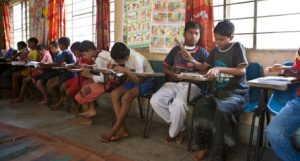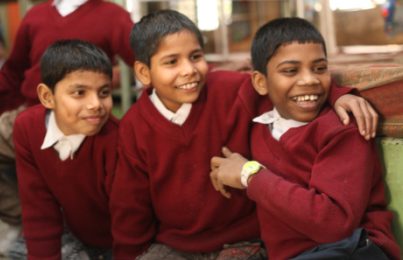When ten-year-old Sadhil was brought to the Tabaar centre in Jaipur, India, his body was scarred, his face swollen and he desperately needed food and medicines. Sadhil was rescued from a bangles-making factory in Jaipur, where he suffered unsurmountable torture as a bonded child labourer.
Sahdil grew up in one of India’s poorest states, Bihar, where nearly 40% of the population is below the poverty line. When his mother died prematurely, he was sent to live with his elder sister and brother-in-law in a nearby village. The young family struggled to make ends meet and found the perfect opportunity for Sadhil when a local man lured them with employment possibilities in a factory in Jaipur.
Once in Jaipur, the man’s behaviour changed, he drank heavily every day and hit Sadhil with whatever came to hand – including an iron rod. Sadhil was beaten for asking for food, and when he wanted to contact his sister the man burnt his neck with a heated iron rod. Sadhil was not safe in the factory either where he was made to sleep alongside older boys who sexually abused him. Sadhil survived these terrible conditions for two years, when he was totally cut off from his family and given no wages.
His ordeal came to an end when Jaipur-based NGO Taabar and the Child Labour Free Jaipur Initiative (CLFJ), supported by the British Asian Trust, rescued him. Sadhil’s employer was arrested and Sadhil was taken in to live in the Tabaar shelter home.
He now attends art-based therapy sessions and is back to school, and is reported to show remarkable ability while preparing himself to chase his dreams of becoming an engineer.
“Under the Child Labour Free Jaipur (CLFJ) initiative, we are positioning Jaipur as a city with unprecedented commitment to stopping child labour by strengthening its industries and serving as a model for other cities to follow,” said Richard Hawkes, the Chief Executive of British Asian Trust.
Rajasthan and Bihar: the hotbeds for child labour
Jaipur is a world-leading centre for production of traditional handicrafts, jewellery, and unique textiles. But some of these products are manufactured by children working in hazardous and illegal conditions. In the workshops, children are often forced to work excessive hours in confined spaces, and are out of contact with their families. They suffer damage to vision, burns, and chronic coughing.
- According to estimates, 50,000 children (80% are boys, while 20% are girls) are trapped in workshops and other forms of child labour in Jaipur
- As per the 2011 Census, Rajasthan has the third largest number of child workers (55% of the children are between 10-14 years of age) and Jaipur has the maximum concentration of these workers
- According to estimates, 80% of children employed in workshops in Jaipur are trafficked from Bihar

British Asian Trust is working in Bihar to contain the problem at the grassroots. “We are working with the local government as well as NGOs in the areas most affected by child trafficking. Our partners are working to enrol children in school, help them with the required documentation and make it easier for them to access entitlements such as victim compensation and government benefits – thereby preventing the risk of re-trafficking,” said Richard.
“We are working with Rajasthan and Bihar Governments to allow smooth repatriation of trafficked children from Rajasthan back to their home state of Bihar, and with existing NGO partners in the main Bihar districts where the children are coming from, to help families to prevent re-trafficking,” he said.
These partners in Bihar are working on recovery of victims, including access to compensation, enrolment in school, and regular follow-up visits, to prevent re-trafficking.
To progressively eliminate child labour in Jaipur, the Trust follows a united strategy that involves engaging the apparel and handicraft businesses, the state governments, enforcement systems and communities at large. Under the programme, BAT is driving the creation of a child labour free certification, which will be provided to suppliers, key business institutions, associations, and training providers that make their production transparent and eliminate child labour from their operations.

“We are increasing consumer awareness and promoting sales of child friendly products through multiple channels – thereby increasing the incentive to suppliers to participate in the certification process. We are also expanding the stream of verified child labour free apparel and other handicrafts by forming women’s producer-owned companies in neighbourhoods affected by high levels of child exploitation.
“Jaipur will become one of the safest places in the world for international retailers and ethical Indian companies to do business – led by local businesses,” said Richard.
BAT is working closely with key government departments and police to increase successful prosecutions against child traffickers, increase care and protection of children in key neighbourhoods. By working closely with local NGOs to build up momentum for child labour free zones in the city.
Key Research to influence policy changes
The CLFJ project has been working intensively for policy changes to protect vulnerable children, succeeding in making it common practice to formally record statements made by child labourers – leading to far better evidence in legal cases against traffickers.
CLFJ research has found that there are an estimated 50,000 children trapped in hazardous workshops in Jaipur, who produce goods including bangles, embroidery, sarees, and semi-precious gems. Many of these children are forced to work for up to 15 hours a day in difficult conditions, leading to long-term damage to their physical and mental health.
The British Asian Trust runs its Anti-trafficking Programme to protect victims of human trafficking from forced labour and sexual exploitation by working with businesses to lower the demand for child labour and encourage them to choose non-exploitative labour. We do so in partnership with local organisations such as Childline India and Taabar and with funding from the John Lewis Foundation. This has led to substantial progress in the past few years.
“We have just achieved a significant victory in getting the first ever life sentence for a trafficker in Rajasthan – which will act as a significant deterrent to traffickers,” confirmed Richard. “Three international retailers and six exporters in Jaipur have signed on to have their supply chains certified against child labour, and for the first time, child labourers rescued in Jaipur are beginning to receive victim compensation from the Government due to the legal and rehabilitative support of our partners working on the ground.”
Challenging the odds
Achievements like these have not come easily for the Trust with unvarying challenges like the lack of coordination between government departments in Rajasthan and Bihar (the states spearheading the projects) and identifying/closing gaps that lead to a lack of successful prosecutions. The Trust’s efforts have resulted in the Juvenile Justice Committee and Child Welfare Committees delegating child labour issues as top priority in their agendas and making the District Child Labour Task Force renew its actions against child labour.
“We are also building the capacity of law enforcement, judiciary, prosecutors and other child protection stakeholders, which will result in better evidence, stronger cases, and real consequences for child traffickers,” said Richard.
 From Jan-June 2019, CLFJ has supported 483 children returning to Bihar for reintegration by assisting them with getting compensation, re-enrolling them in school, and with regular follow-up checks at their homes. It is not easy to predict the future of the children since it depends on the number of children rescued and subsequently repatriated to their home districts.
From Jan-June 2019, CLFJ has supported 483 children returning to Bihar for reintegration by assisting them with getting compensation, re-enrolling them in school, and with regular follow-up checks at their homes. It is not easy to predict the future of the children since it depends on the number of children rescued and subsequently repatriated to their home districts.
From July 2019 to June 2020, CLFJ anticipates another 500 children being rescued and supported by CLFJ, and anticipate approximately 660 additional rescues from July 2020 to June 2021
CLFJ is partnering with leading businesses in Jaipur to create transparency mechanisms that can certify supply chains as child labour free and create awareness among consumers about child labour free goods being produced through this programme. Increasingly, businesses and associations are pledging their support to fight against child labour. Many of them have already pledged their support, thereby incentivising other businesses to do the same. By changing business dynamics to shift away from child labour, we are reducing demand.
How you can help

BAT has raised awareness in the local community through hoardings, bus shelters, posters, street-plays across the city, urging the public to call Childline (1098) if they see child exploitation in Jaipur. As the city progresses against child labour, BAT aims to disseminate the model to encourage adoption by agencies in other areas.
“We are always eager to work with like-minded organisations with whom we can build programmes that use innovative approaches like technology, for example, or work with businesses and supply chains to reduce the vulnerability of children to trafficking and abuse. The British Asian Trust is always available to speak with other organisations about how we can partner,” said Richard.
“You can support this movement by encouraging your friends and families to become conscious consumers and purchasing goods made ethically – look out for the Child Labour Free goods that will be launched later this year in Jaipur,” he said.
————————————————————————-
Please note that the number of children being supported under CLFJ is only one component of a larger holistic approach that is being employed to reduce child labour in Jaipur, including strengthening the legal system and bringing strong cases against traffickers, working with communities to build resistance to child labour, supporting businesses to move towards child labour free supply chains, empowering women to create a skilled adult work force, etc.
Smita is a multi-cultural freelance journalist, writer, and filmmaker based out of the US, London, Hong Kong, and India. Global Indian Stories is her brain-child. Created to chronicle diaspora stories written by Indians of all age groups, from different walks of life across the globe, Smita makes sure that the platform remains inclusive and positive.


![Powerful Pride documentary Legendary Children [All Of Them Queer] streaming very soon](https://globalindianstories.org/wp-content/uploads/2025/06/Legendary-streaming-release-featured-238x178.jpg)



![Powerful Pride documentary Legendary Children [All Of Them Queer] streaming very soon](https://globalindianstories.org/wp-content/uploads/2025/06/Legendary-streaming-release-featured-100x75.jpg)

